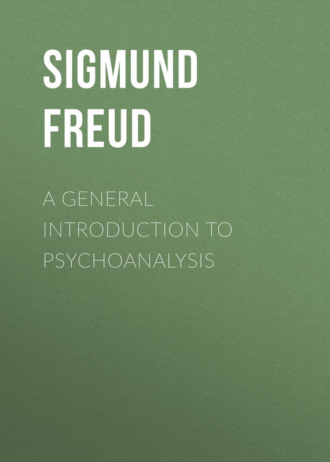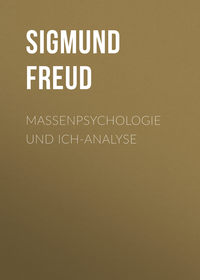 полная версия
полная версияA General Introduction to Psychoanalysis
The most interesting questions which we formulated while considering errors, and which we have not yet answered, are, I presume, the following: We said that the errors are the result of the mutual interference of two different intentions, of which the one can be called the intention interfered with, and the other the interfering intention. The intentions interfered with give rise to no further questions, but concerning the others we want to know, firstly, what kind of intentions are these which arise as disturbers of others, and secondly, in what proportions are the interfering related to the interfered?
Will you permit me again to take the slip of the tongue as representative of the whole species and allow me to answer the second question before the first?
The interfering intention in the tongue slip may stand in a significant relation to the intention interfered with, and then the former contains a contradiction of the latter, correcting or supplementing it. Or, to take a less intelligible and more interesting case, the interfering intention has nothing to do with the intention interfered with.
Proofs for the first of the two relations we can find without trouble in the examples which we already know and in others similar to those. In almost all cases of tongue slips where one says the contrary of what he intended, where the interfering intention expresses the antithesis of the intention interfered with, the error is the presentation of the conflict between two irreconcilable strivings. "I declare the meeting opened, but would rather have it closed," is the meaning of the president's slip. A political paper which has been accused of corruptibility, defends itself in an article meant to reach a climax in the words: "Our readers will testify that we have always interceded for the good of all in the most disinterested manner." But the editor who had been entrusted with the composition of the defence, wrote, "in the most interested manner." That is, he thinks "To be sure, I have to write this way, but I know better." A representative of the people who urges that the Kaiser should be told the truth "rückhaltlos," hears an inner voice which is frightened by his boldness, and which through a slip changes the "rückhaltlos" into "rückgratlos."17
In the examples familiar to you, which give the impression of contraction and abbreviation, it is a question of a correction, an addition or continuation by which the second tendency manifests itself together with the first. "Things were revealed, but better say it right out, they were filthy, therefore, things were refiled."18 "The people who understand this topic can be counted on the fingers of one hand, but no, there is really only one who understands it; therefore, counted on one finger." Or, "My husband may eat and drink whatever he wants. But you know very well that I don't permit him to want anything; therefore he may eat and drink whatever I want." In all these cases, therefore, the slip arises from the content of the intention itself, or is connected with it.
The other type of relationship between the two interfering intentions seems strange. If the interfering intention has nothing to do with the content of the one interfered with, where then does it come from and how does it happen to make itself manifest as interference just at that point? The observation which alone can furnish an answer here, recognizes the fact that the interference originates in a thought process which has just previously occupied the person in question and which then has that after-effect, irrespective of whether it has already found expression in speech or not. It is therefore really to be designated as perseveration, but not necessarily as the perseveration of spoken words. Here also there is no lack of an associative connection between the interfering and the interfered with, yet it is not given in the content, but artificially restored, often by means of forced connecting links.
Here is a simple example of this, which I myself observed. In our beautiful Dolomites, I meet two Viennese ladies who are gotten up as tourists. I accompany them a short distance and we discuss the pleasures, but also the difficulties of the tourist's mode of life. One lady admits this way of spending the day entails much discomfort. "It is true," she says, "that it is not at all pleasant, when one has tramped all day in the sun, and waist and shirt are soaked through." At this point in this sentence she suddenly has to overcome a slight hesitancy. Then she continues: "But then, when one gets nach Hose, and can change…"19 We did not analyze this slip, but I am sure you can easily understand it. The lady wanted to make the enumeration more complete and to say, "Waist, shirt and drawers." From motives of propriety, the mention of the drawers (Hose) was suppressed, but in the next sentence of quite independent content the unuttered word came to light as a distortion of the similar word, house (Hause).
Now we can turn at last to the long delayed main question, namely, what kind of intentions are these which get themselves expressed in an unusual way as interferences of others, intentions within whose great variety we wish nevertheless to find what is common to them all! If we examine a series of them to this end, we will soon find that they divide themselves into three groups. In the first group belong the cases in which the interfering tendency is known to the speaker, and which, moreover, was felt by him before the slip. Thus, in the case of the slip "refilled," the speaker not only admits that he agreed with the judgment "filthy," on the incidents in question, but also that he had the intention (which he later abandoned) of giving it verbal expression. A second group is made up of those cases in which the interfering tendency is immediately recognized by the subject as his own, but in which he is ignorant of the fact that the interfering tendency was active in him just before the slip. He therefore accepts our interpretation, yet remains to a certain extent surprised by it. Examples of this situation can perhaps more easily be found among errors other than slips of the tongue. In a third group the interpretation of the interfering intention is energetically denied by the speaker. He not only denies that the interfering tendency was active in him before the slip, but he wants to assert that it was at all times completely alien to him. Will you recall the example of "hiccough," and the absolutely impolite disavowal which I received at the hands of this speaker by my disclosure of the interfering intention. You know that so far we have no unity in our conception of these cases. I pay no attention to the toastmaster's disavowal and hold fast to my interpretation; while you, I am sure, are yet under the influence of his repudiation and are considering whether one ought not to forego the interpretation of such slips, and let them pass as purely physiological acts, incapable of further analysis. I can imagine what it is that frightens you off. My interpretation draws the conclusion that intentions of which he himself knows nothing may manifest themselves in a speaker, and that I can deduce them from the circumstances. You hesitate before so novel a conclusion and one so full of consequences. I understand that, and sympathize with you to that extent. But let us make one thing clear: if you want consistently to carry through the conception of errors which you have derived from so many examples, you must decide to accept the above conclusion, even though it be unpleasant. If you cannot do so, you must give up that understanding of errors which you have so recently won.
Let us tarry a while over the point which unites the three groups, which is common to the three mechanisms of tongue slips. Fortunately, that is unmistakable. In the first two groups the interfering tendency is recognized by the speaker; in the first there is the additional fact that it showed itself immediately before the slip. In both cases, however, it was suppressed. The speaker had made up his mind not to convert the interfering tendency into speech and then the slip of the tongue occurred; that is to say, the suppressed tendency obtains expression against the speaker's will, in that it changes the expression of the intention which he permits, mixes itself with it or actually puts itself in its place. This is, then, the mechanism of the tongue slip.
From my point of view, I can also best harmonize the processes of the third group with the mechanism here described. I need only assume that these three groups are differentiated by the different degrees of effectiveness attending the suppression of an intention. In the first group, the intention is present and makes itself perceptible before the utterance of the speaker; not until then does it suffer the suppression for which it indemnifies itself in the slip. In the second group the suppression extends farther. The intention is no longer perceptible before the subject speaks. It is remarkable that the interfering intention is in no way deterred by this from taking part in the causation of the slip. Through this fact, however, the explanation of the procedure in the third group is simplified for us. I shall be so bold as to assume that in the error a tendency can manifest itself which has been suppressed for even a longer time, perhaps a very long time, which does not become perceptible and which, therefore, cannot be directly denied by the speaker. But leave the problem of the third group; from the observation of the other cases, you most draw the conclusion that the suppression of the existing intention to say something is the indispensable condition of the occurrence of a slip.
We may now claim that we have made further progress in understanding errors. We know not only that they are psychic acts, in which we can recognize meaning and purpose, and that they arise through the mutual interference of two different intentions, but, in addition, we know that one of these intentions must have undergone a certain suppression in order to be able to manifest itself through interference with the other. The interfering intention must itself first be interfered with before it can become interfering. Naturally, a complete explanation of the phenomena which we call errors is not attained to by this. We immediately see further questions arising, and suspect in general that there will be more occasions for new questions as we progress further. We might, for example, ask why the matter does not proceed much more simply. If there is an existing purpose to suppress a certain tendency instead of giving it expression, then this suppression should be so successful that nothing at all of the latter comes to light; or it could even fail, so that the suppressed tendency attains to full expression. But errors are compromise formations. They mean some success and some failure for each of the two purposes. The endangered intention is neither completely suppressed nor does it, without regard to individual cases, come through wholly intact. We can imagine that special conditions must be existent for the occurrence of such interference or compromise formations, but then we cannot even conjecture what sort they may be. Nor do I believe that we can uncover these unknown circumstances through further penetration into the study of errors. Rather will it be necessary thoroughly to examine other obscure fields of psychic life. Only the analogies which we there encounter can give us the courage to draw those assumptions which are requisite to a more fundamental elucidation of errors. And one thing more. Even working with small signs, as we have constantly been in the habit of doing in this province, brings its dangers with it. There is a mental disease, combined paranoia, in which the utilization of such small signs is practiced without restriction and I naturally would not wish to give it as my opinion that these conclusions, built up on this basis, are correct throughout. We can be protected from such dangers only by the broad basis of our observations, by the repetition of similar impressions from the most varied fields of psychic life.
We will therefore leave the analysis of errors here. But may I remind you of one thing more: keep in mind, as a prototype, the manner in which we have treated these phenomena. You can see from these examples what the purposes of our psychology are. We do not wish merely to describe the phenomena and to classify them, but to comprehend them as signs of a play of forces in the psychic, as expressions of tendencies striving to an end, tendencies which work together or against one another. We seek a dynamic conception of psychic phenomena. The perceived phenomena must, in our conception, give way to those strivings whose existence is only assumed.
Hence we will not go deeper into the problem of errors, but we can still undertake an expedition through the length of this field, in which we will reëncounter things familiar to us, and will come upon the tracks of some that are new. In so doing we will keep to the division which we made in the beginning of our study, of the three groups of tongue slips, with the related forms of pen slips, misreadings, mishearings, forgetfulness with its subdivisions according to the forgotten object (proper names, foreign words, projects, impressions), and the other faults of mistaking, mislaying and losing objects. Errors, in so far as they come into our consideration, are grouped in part with forgetfulness, in part with mistakes.
We have already spoken in such detail of tongue slips, and yet there are still several points to be added. Linked with tongue slips are smaller effective phenomena which are not entirely without interest. No one likes to make a slip of the tongue; often one fails to hear his own slip, though never that of another. Tongue slips are in a certain sense infectious; it is not at all easy to discuss tongue slips without falling into slips of the tongue oneself. The most trifling forms of tongue slips are just the ones which have no particular illumination to throw on the hidden psychic processes, but are nevertheless not difficult to penetrate in their motivation. If, for example, anyone pronounces a long vowel as a short, in consequence of an interference no matter how motivated, he will for that reason soon after lengthen a short vowel and commit a new slip in compensation for the earlier one. The same thing occurs when one has pronounced a double vowel unclearly and hastily; for example, an "eu" or an "oi" as "ei." The speaker tries to correct it by changing a subsequent "ei" or "eu" to "oi." In this conduct the determining factor seems to be a certain consideration for the hearer, who is not to think that it is immaterial to the speaker how he treats his mother tongue. The second, compensating distortion actually has the purpose of making the hearer conscious of the first, and of assuring him that it also did not escape the speaker. The most frequent and most trifling cases of slips consist in the contractions and foresoundings which show themselves in inconspicuous parts of speech. One's tongue slips in a longer speech to such an extent that the last word of the intended speech is said too soon. That gives the impression of a certain impatience to be finished with the sentence and gives proof in general of a certain resistance to communicating this sentence or speech as a whole. Thus we come to borderline cases in which the differences between the psychoanalytic and the common physiological conception of tongue slips are blended. We assume that in these cases there is a tendency which interferes with the intention of the speech. But it can only announce that it is present, and not what its own intention is. The interference which it occasions then follows some sound influences or associative relationship, and may be considered as a distraction of attention from the intended speech. But neither this disturbance of attention nor the associative tendency which has been activated, strikes the essence of the process. This hints, however, at the existence of an intention which interferes with the purposed speech, an intention whose nature cannot (as is possible in all the more pronounced cases of tongue slips) this time be guessed from its effects.
Slips of the pen, to which I now turn, are in agreement with those of the tongue to the extent that we need expect to gain no new points of view from them. Perhaps we will be content with a small gleaning. Those very common little slips of the pen – contractions, anticipations of later words, particularly of the last words – again point to a general distaste for writing, and to an impatience to be done; the pronounced effects of pen slips permit the nature and purpose of the interfering tendency to be recognized. One knows in general that if one finds a slip of the pen in a letter everything was not as usual with the writer. What was the matter one cannot always establish. The pen slip is frequently as little noticed by the person who makes it as the tongue slip. The following observation is striking: There are some persons who have the habit of always rereading a letter they have written before sending it. Others do not do so. But if the latter make an exception and reread the letter, they always have the opportunity of finding and correcting a conspicuous pen slip. How can that be explained? This looks as if these persons knew that they had made a slip of the pen while writing the letter. Shall we really believe that such is the case?
There is an interesting problem linked with the practical significance of the pen slip. You may recall the case of the murderer H., who made a practice of obtaining cultures of the most dangerous disease germs from scientific institutions, by pretending to be a bacteriologist, and who used these cultures to get his close relatives out of the way in this most modern fashion. This man once complained to the authorities of such an institution about the ineffectiveness of the culture which had been sent to him, but committed a pen slip and instead of the words, "in my attempts on mice and guinea pigs," was plainly written, "in my attempts on people."20 This slip even attracted the attention of the doctors at the institution, but so far as I know, they drew no conclusion from it. Now what do you think? Might not the doctors better have accepted the slip as a confession and instituted an investigation through which the murderer's handiwork would have been blocked in time? In this case was not ignorance of our conception of errors to blame for an omission of practical importance? Well, I am inclined to think that such a slip would surely seem very suspicious to me, but a fact of great importance stands in the way of its utilization as a confession. The thing is not so simple. The pen slip is surely an indication, but by itself it would not have been sufficient to instigate an investigation. That the man is preoccupied with the thought of infecting human beings, the slip certainly does betray, but it does not make it possible to decide whether this thought has the value of a clear plan of injury or merely of a phantasy having no practical consequence. It is even possible that the person who made such a slip will deny this phantasy with the best subjective justification and will reject it as something entirely alien to him. Later, when we give our attention to the difference between psychic and material reality, you will understand these possibilities even better. Yet this is again a case in which an error later attained unsuspected significance.
In misreading, we encounter a psychic situation which is clearly differentiated from that of the tongue slips or pen slips. The one of the two rival tendencies is here replaced by a sensory stimulus and perhaps for that reason is less resistant. What one is reading is not a production of one's own psychic activity, as is something which one intends to write. In a large majority of cases, therefore, the misreading consists in a complete substitution. One substitutes another word for the word to be read, and there need be no connection in meaning between the text and the product of the misreading. In general, the slip is based upon a word resemblance. Lichtenberg's example of reading "Agamemnon" for "angenommen"21 is the best of this group. If one wishes to discover the interfering tendency which causes the misreading, one may completely ignore the misread text and can begin the analytic investigation with the two questions: What is the first idea that occurs in free association to the product of the misreading, and, in what situation did the misreading occur? Now and then a knowledge of the latter suffices by itself to explain the misreading. Take, for example, the individual who, distressed by certain needs, wanders about in a strange city and reads the word "Closethaus" on a large sign on the first floor of a house. He has just time to be surprised at the fact that the sign has been nailed so high up when he discovers that, accurately observed, the sign reads "Corset-haus." In other cases the misreadings which are independent of the text require a penetrating analysis which cannot be accomplished without practice and confidence in the psychoanalytic technique. But generally it is not a matter of much difficulty to obtain the elucidation of a misreading. The substituted word, as in the example, "Agamemnon," betrays without more ado the thought sequence from which the interference results. In war times, for instance, it is very common for one to read into everything which contains a similar word structure, the names of the cities, generals and military expressions which are constantly buzzing around us. In this way, whatever interests and preoccupies one puts itself in the place of that which is foreign or uninteresting. The after-effects of thoughts blur the new perceptions.
There are other types of misreadings, in which the text itself arouses the disturbing tendency, by means of which it is then most often changed into its opposite. One reads something which is undesired; analysis then convinces one that an intensive wish to reject what has been read should be made responsible for the alteration.
In the first mentioned and more frequent cases of misreading, two factors are neglected to which we gave an important role in the mechanism of errors: the conflict of two tendencies and the suppression of one which then indemnifies itself by producing the error. Not that anything like the opposite occurs in misreading, but the importunity of the idea content which leads to misreading is nevertheless much more conspicuous than the suppression to which the latter may previously have been subjected. Just these two factors are most tangibly apparent in the various situations of errors of forgetfulness.
Forgetting plans is actually uniform in meaning; its interpretation is, as we have heard, not denied even by the layman. The tendency interfering with the plan is always an antithetical intention, an unwillingness concerning which we need only discover why it does not come to expression in a different and less disguised manner. But the existence of this unwillingness is not to be doubted. Sometimes it is possible even to guess something of the motives which make it necessary for this unwillingness to disguise itself, and it always achieves its purpose by the error resulting from the concealment, while its rejection would be certain were it to present itself as open contradiction. If an important change in the psychic situation occurs between the formulation of the plan and its execution, in consequence of which the execution of the plan does not come into question, then the fact that the plan was forgotten is no longer in the class of errors. One is no longer surprised at it, and one understands that it would have been superfluous to have remembered the plan; it was then permanently or temporarily effaced. Forgetting a plan can be called an error only when we have no reason to believe there was such an interruption.
The cases of forgetting plans are in general so uniform and transparent that they do not interest us in our investigation. There are two points, however, from which we can learn something new. We have said that forgetting, that is, the non-execution of a plan, points to an antipathy toward it. This certainly holds, but, according to the results of our investigations, the antipathy may be of two sorts, direct and indirect. What is meant by the latter can best be explained by one or two examples. If a patron forgets to say a good word for his protegé to a third person, it may be because the patron is not really very much interested in the protegé, therefore, has no great inclination to commend him. It is, at any rate, in this sense that the protegé will construe his patron's forgetfulness. But the matter may be more complicated. The patron's antipathy to the execution of the plan may originate in another quarter and fasten upon quite a different point. It need not have anything to do with the protegé, but may be directed toward the third person to whom the good word was to have been said. Thus, you see what doubts here confront the practical application of our interpretation. The protegé, despite a correct interpretation of the forgetfulness, stands in danger of becoming too suspicious, and of doing his patron a grave injustice. Or, if an individual forgets a rendezvous which he has made, and which he had resolved to keep, the most frequent basis will certainly be the direct aversion to encountering this person. But analysis might here supply the information that the interfering intention was not directed against that person, but against the place in which they were to have met, and which was avoided because of a painful memory associated with it. Or, if one forgets to mail a letter, the counter-intention may be directed against the content of that letter, yet this does not in any way exclude the possibility that the letter is harmless in itself, and only subject to the counter-intention because something about it reminds the writer of another letter written previously, which, in fact, did afford a basis for the antipathy. One can say in such a case that the antipathy has here transferred itself from that former letter where it was justified to the present one in which it really has no meaning. Thus you see that one must always exercise restraint and caution in the application of interpretations, even though the interpretations are justified. That which is psychologically equivalent may nevertheless in practice be very ambiguous.









